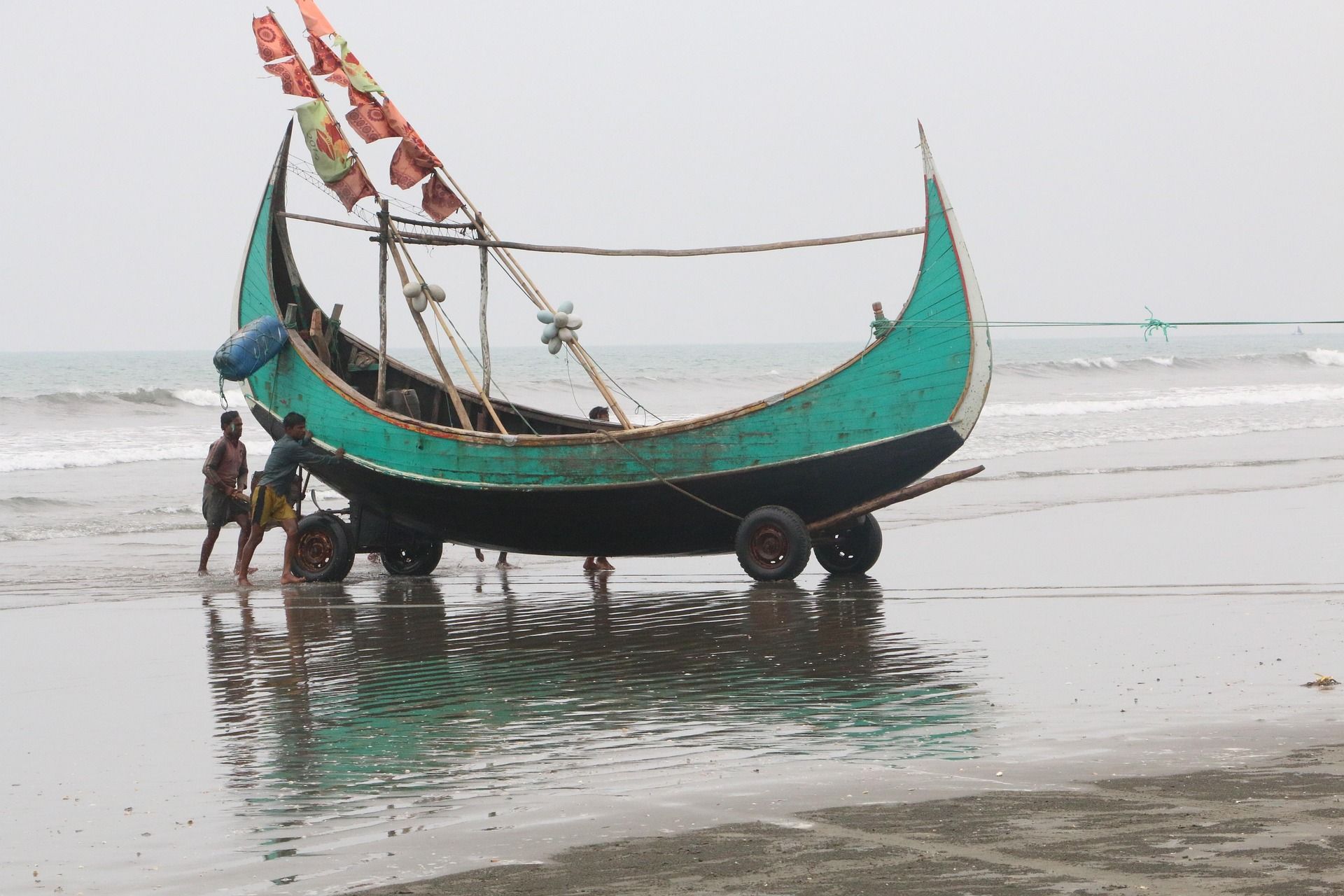
general information
Estimate Nominal GDP
(2025): $ 481.86 billion
Estimate GDP from the Ocean Economy
(2015) 3% of total GDP
General Coastline
approximately 710 km
Estimate Population
(2025): 175.655.977
Registered In-Country Companies
approximately 275.460
UN Global Compact Participants by April 2025
58

overview
Bangladesh is well-positioned to advance ocean sustainability, with strong potential in fisheries, offshore energy, and port modernization. However, structural and governance challenges persist – marked by limited competition, low stakeholder consultation, fragmented state responsibilities, and weak focus on environmental planning. Climate risks, moderate infrastructure, and safety standards further constrain progress. Opportunities include building safety awareness in the fishing sector, integrating sustainability into new port development, and leveraging untapped marine resources. Strengthening coordination among state entities and fostering inclusive public-private collaboration will be essential to scale Bangladesh’s blue economy in a more resilient, transparent, and future-ready direction.
Advancing a Safe and Sustainable Ocean Economy in Bangladesh
The Scoping Phase aimed to identify opportunities, challenges, and actionable strategies for developing a sustainable ocean economy in Bangladesh. It focused on seafood systems, shipping and ports, offshore renewables, and finance & investment—supporting climate resilience, economic growth, and environmental conservation.
Bangladesh faces several pressing challenges. Unregulated fishing, marine pollution, and habitat degradation threaten biodiversity, while climate change impacts—such as rising sea levels and cyclones—worsen vulnerabilities. These issues are compounded by moderate infrastructure, limited technology, weak regulatory enforcement, and fragmented governance. Low stakeholder coordination and insufficient investment continue to hinder sustainable progress.
Despite these constraints, Bangladesh holds vast potential. Its maritime resources in the Bay of Bengal create strong opportunities in sustainable fisheries, aquaculture, hydrocarbons, and marine biotechnology. Developing offshore energy—such as wind and tidal—can contribute to energy security, while modernizing ports and shipping can improve trade connectivity. Blue carbon initiatives and eco-tourism offer additional revenue streams, provided investments in technology, infrastructure, and policy alignment are prioritized.

Valuable insights also emerged during the Scoping Phase. Discoveries of new marine species, deep-sea minerals, and renewable energy potential highlight Bangladesh's untapped natural assets. Innovations in pollution management, fisheries, and coastal planning could diversify the economy, create jobs, and strengthen environmental resilience—particularly through international collaboration and local knowledge integration.
Safety remains a critical issue across ocean industries. Outdated regulations, poor enforcement, aging infrastructure, and insufficient worker training increase risks, especially in the face of climate-related hazards. Coordination gaps among stakeholders further weaken safety standards. However, these challenges present an opportunity to modernize infrastructure, adopt new technologies, improve training, and strengthen compliance. International partnerships can also support disaster preparedness and long-term risk management.
The priorities of Bangladesh’s Ocean Centres across the four Action Areas are ranked as follows:
1
Fishing & Aquaculture
2
Shipping &
Ports
3
Offshore
Renewables
4
Finance &
Investment
Expected national outcomes include safer and more productive seafood systems, modernized port infrastructure, expanded renewable energy, and increased investment in innovation. Together, these will foster inclusive growth, environmental sustainability, and climate resilience.
We believe that, at a global level, the Ocean Centres initiative will strengthen food security, port efficiency, clean energy development, and biodiversity protection. As hubs for sustainable ocean stewardship, they will drive long-term economic and environmental benefits through collaboration, innovation, and investment.
OCEAN CENTRES, BANGLADESH
local guidances
Shipping & Ports
Fishing & Aquaculture
Offshore Renewables
Finance & Investment
local news
List of Services
-
Bangladesh greenlights $1.3b wind energy project BangladeshBangladesh greenlights $1.3b wind energy project
-
Bangladesh moves up a notch in ranking of fish production BangladeshBangladesh moves up a notch in ranking of fish production
-
H&M, Bestseller to invest in 500MW offshore wind project in Bangladesh BangladeshH&M, Bestseller to invest in 500MW offshore wind project in Bangladesh
-
Kutubdia wind power plant under threat BangladeshKutubdia wind power plant under threat
-
Offshore wind energy study on the cards to assess potential BangladeshOffshore wind energy study on the cards to assess potential
-
‘Bangladesh targets producing 85 lakh tonnes of fish by 2041’ Bangladesh‘Bangladesh targets producing 85 lakh tonnes of fish by 2041’
local Events
List of Services
-
13TH SOLAR EXPO BANGLADESH 2025 Bangladesh13TH SOLAR EXPO BANGLADESH 2025
-
AQUACULTURE CONFERENCE 2025 BANGLADESH BangladeshAQUACULTURE CONFERENCE 2025 BANGLADESH
-
Bangladesh Business Summit 2023, Out come report BangladeshBangladesh Business Summit 2023, Out come report
-
Fisheries Entrepreneur Summit 2025 BangladeshFisheries Entrepreneur Summit 2025
-
International FISHERIES SUMMIT & EXPO BANGLADESH 2026 BangladeshInternational FISHERIES SUMMIT & EXPO BANGLADESH 2026
-
Renewable Energy Bangladesh Investment Summit BangladeshRenewable Energy Bangladesh Investment Summit




